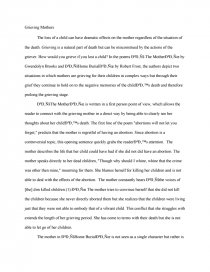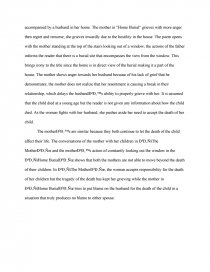Grieving Mothers
Essay by 24 • January 9, 2011 • 626 Words (3 Pages) • 1,223 Views
Grieving Mothers
The loss of a child can have dramatic effects on the mother regardless of the situation of the death. Grieving is a natural part of death but can be misconstrued by the actions of the griever. How would you grieve if you lost a child? In the poems “ The Mother” by Gwendolyn Brooks and “Home Burial” by Robert Frost, the authors depict two situations in which mothers are grieving for their children in complex ways but through their grief they continue to hold on to the negative memories of the child’s death and therefore prolong the grieving stage.
“The Mother” is written in a first person point of view, which allows the reader to connect with the grieving mother in a direct way by being able to clearly see her thoughts about her child’s death. The first line of the poem "abortions will not let you forget," predicts that the mother is regretful of having an abortion. Since abortion is a controversial topic, this opening sentence quickly grabs the reader’s attention. The mother describes the life that her child could have had if she did not did have an abortion. The mother speaks directly to her dead children, "Though why should I whine, whine that the crime was other then mine," mourning for them. She blames herself for killing her children and is not able to deal with the effects of the abortion. The mother constantly hears “the voices of [the] dim killed children (1).” The mother tries to convince herself that she did not kill the children because she never directly aborted them but she realizes that the children were living just that they were not able to embody that of a vibrant child. This conflict that she struggles with extends the length of her grieving period. She has come to terms with their death but she is not able to let go of her children.
The mother in “Home Burial” is not seen as a single character but rather is accompanied by a husband in her home. The mother in "Home Burial" grieves with more anger then regret and remorse; she grieves inwardly due to the hostility in the house. The poem
...
...

